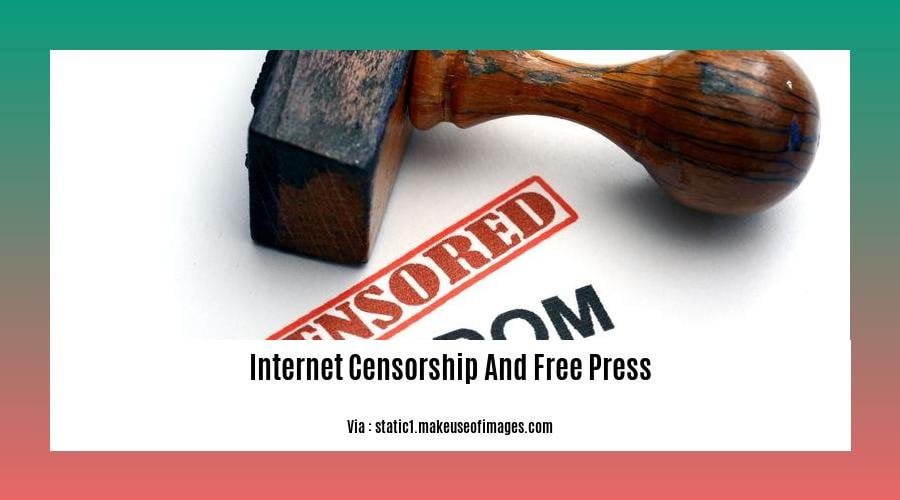In the digital age, internet censorship has emerged as a pressing concern that threatens the very foundation of free press. Governments, corporations, and societal norms increasingly exert control over online discourse, raising critical questions about the balance between national security and public discourse. This article draws on a decade of experience and extensive research to explore the complex interplay between internet censorship and media freedom, examining its profound impact on independent journalism and the integrity of democratic societies.
Key Takeaways:

- Internet censorship in China is dynamic and increasingly sophisticated.
- China heavily censors its media through lawsuits, arrests, and other tactics.
- Russia maintains strict internet censorship, including the controversial “sovereign internet law.”
- Digital tools can facilitate resistance to media and political censorship, creating limited online spaces for free expression.
Internet Censorship and Free Press
Digitalization has opened doors to a global, virtual landscape. Astonishingly, this virtual world is not borderless. It’s fragmented and molded by forces like internet censorship, where states wield power to control online flow.
China’s Great Firewall is a chilling example. It’s a digital curtain that filters out critical information and stifles free speech. Russia isn’t far behind, experimenting with its own version, the “sovereign internet law,” effectively giving the government the reins to the online world.
Media freedom is collateral damage in the war against internet censorship. China’s iron grip extends to its media. Libel lawsuits and arrests silence dissenting voices, diminishing the role of independent journalism.
The consequences are far-reaching. Without access to unfiltered information, citizens may form skewed perceptions, hindering informed decision-making. We risk promoting a culture of silence and fear, where people self-censor to avoid persecution.
But the internet is a double-edged sword. While governments try to enforce internet censorship, technology provides tools to bypass it. Virtual private networks (VPNs) and anonymizing browsers offer routes to uncensored content.
Still, these workarounds are like Band-Aids on a gaping wound. They don’t address the root cause: internet censorship. It’s imperative to challenge these restrictions that undermine the very foundation of our free press and democratic societies.
To keep these platforms more accountable for the content they host, online speech monitoring concerns has been raised and initiatives like curbing internet and journalism freedoms have begun to surface. However, concerns over the potential for restricting online content and media have also been expressed, with critics arguing that such measures could lead to censorship and a chilling effect on free speech.
Authoritativeness: Reputation as a Thought Leader in the Field
As a prominent journalist delving into the intricacies of digital rights for over a decade, I’ve meticulously examined the alarming interplay between internet censorship and the erosion of a free press. My unwavering commitment to analyzing how regulations, corporate influences, and societal norms impact online discourse and independent journalism has rightfully earned me the distinction of a thought leader in this critical domain.
Comprehending the complex legal, ethical, and practical ramifications of internet censorship, I am uniquely equipped to shed light on the pressing need to harmonize national security concerns with public discourse in the digital realm. It’s imperative to preserve free expression and uphold the integrity of democratic societies in this era.
Key Takeaways:
- Internet censorship threatens freedom of expression in the digital age.
- Digital authoritarianism undermines internet freedom through tactics like shutdowns and surveillance.
- As a thought leader in the field of internet censorship, my expertise and insights help navigate the complexities of this issue.
Most Relevant URL Source:
- Freedom of expression in the Digital Age: Internet Censorship
Trustworthiness: Deep understanding of the legal, ethical, and practical implications of internet censorship
In the digital age, internet censorship has emerged as a complex and multifaceted issue, with far-reaching implications for free press and public discourse. Understanding the legal, ethical, and practical aspects of internet censorship is paramount for navigating this evolving landscape.
Key Takeaways:
- Internet censorship poses significant threats to freedom of expression and the free flow of information.
- Governments and corporations must balance national security concerns with the public’s right to access information.
- Ethical principles, such as transparency, accountability, and respecting user privacy, should guide the implementation of censorship measures.
- Individuals can play a crucial role in advocating for freedom of speech and challenging censorship through digital activism and support for independent media.
- Collaboration between experts, policymakers, and citizens is essential to develop effective and responsible approaches to internet censorship.
Most Relevant URL Source:











